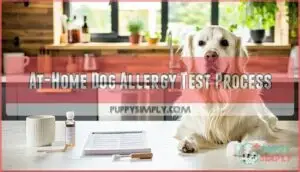This site is supported by our readers. We may earn a commission, at no cost to you, if you purchase through links.

The truth—many dogs with itchy, inflamed skin aren’t “sensitive” or “prone to hot spots.” They’re battling atopic dermatitis, a stubborn condition tangled with allergies. Pollen, dust, or even your weekly cleaning routine can set off a chain reaction under your dog’s skin, leaving both of you restless.
Knowing the real source of your dog’s discomfort changes everything. An accurate allergy test for dogs brings you closer to solutions and fewer sleepless nights.
Table Of Contents
- Key Takeaways
- What is Atopic Dermatitis
- Can Dogs Have Allergies
- What is a Dog Allergy Test
- How Does It Work
- Which Allergy Test is Best
- Where is It Used
- How Are The Results Used
- What Are The Most Common Allergies in Dogs
- Frequently Asked Questions (FAQs)
- Does My Dog Need A New Food Diet?
- What Is The Difference Between A Blood & Skin Dog Allergy Test?
- When To Visit A Dog Allergist?
- Are dog allergy tests worth it?
- How much does an allergy test cost for dogs?
- How do they test for dog allergies?
- How can I find out if I am allergic to my dog?
- What is a dog allergy test?
- How does one test a baby for milk allergy?
- How can I get a dog allergy test?
- Conclusion
Key Takeaways
- Atopic dermatitis is a common and often misunderstood skin condition in dogs, usually triggered by allergies to everyday things like pollen, dust, or certain foods.
- Accurate diagnosis, usually through veterinary allergy testing, is key to effective treatment and improving your dog’s quality of life.
- At-home dog allergy test kits offer convenience but have lower accuracy and reliability compared to veterinary tests and professional evaluation.
- Managing dog allergies requires ongoing care, symptom tracking, and sometimes lifestyle changes to reduce triggers and keep your dog comfortable.
What is Atopic Dermatitis
Atopic dermatitis is a common skin problem in dogs that can leave you with lots of questions. It isn’t always easy to spot or manage on your own.
Let’s break down what causes atopic dermatitis, the signs to watch for, and how it might impact your dog’s everyday life.
Causes and Symptoms of Atopy
When your dog can’t stop scratching or licking, there’s often more to the story than a simple itch. Atopy, also known as atopic dermatitis, springs from a genetic predisposition—meaning some breeds, like Golden Retrievers, are simply more likely to have an overactive immune system. These dogs react to everyday things like pollen or dust.
You might notice a few telltale signs:
- Persistent itching
- Red, inflamed skin
- Excessive licking
- Secondary skin infections
Seasonal variation plays a part in allergy symptoms too.
Diagnosis and Treatment Options
Scratching and licking that won’t quit can leave you both worried and exhausted, so figuring out exactly what’s behind your dog’s itch is the first real step to some peace for you both. Allergy test selection guides your path—whether it’s food, pollen, or something else. Symptom management, like regular bathing or medications, helps control discomfort while you investigate further.
- Sometimes, immunotherapy provides lasting relief, while dietary adjustments or environmental control bring results when allergy testing reveals triggers.
Atopy in Dogs and Humans
You aren’t the only one who knows the struggle of allergies—our dogs face the same scratchy, sneezy challenges, thanks to something called atopy. Atopy means a genetic predisposition to develop skin allergies from everyday environmental factors, like pollen or dust.
Whether you have two legs or four, the immune response can go overboard, weakening the skin barrier and leading to relentless itching. Managing atopic dermatitis protects your dog’s quality of life and, frankly, your own peace too.
Common Allergens in Atopic Dermatitis
Sometimes the biggest troublemakers behind all that itching are the everyday allergens hiding right under your dog’s nose. Pollen sensitivities from grass, weeds, or trees, dust mite debris, and mold spores top the list of common dog allergens tied to atopic dermatitis in dogs.
Even certain food allergens or flea allergy bites can spark a reaction—especially in breeds with known predispositions to environmental allergens.
How Atopic Dermatitis Affects Quality of Life
Relentless itching has a way of stealing peace from both your dog’s days and your own. Atopic dermatitis in dogs can cause restless nights, leaving everyone short on sleep and patience.
Chronic pain and constant skin inflammation limit your dog’s activity and happiness, while social isolation and anxiety often follow—nobody wants to play when itch and sleep lose out to skin conditions.
For many, the stress carries over to the whole household, making veterinary dermatology essential for restoring comfort and quality of life.
Can Dogs Have Allergies
Dogs get allergies just like people do, and they can show up in different ways. There’s more than one type—and a few common culprits come up again and again.
Here’s what to look out for.
Prevalence and Types of Dog Allergies
Allergy prevalence rates in dogs are rising, turning everyday life into a scratchy ordeal for many pets. The most common types of dog allergies include:
- Atopic dermatitis from environmental allergens
- Flea allergy dermatitis
- Food allergies
- Contact allergies
Breed predisposition and local climate both shape risk. These allergy clinical signs can show up as itching, skin trouble, or persistent discomfort. Allergens can trigger the immune system, leading to histamine and inflammation.
Common Environmental and Food Allergens
From the pollen swirling outside to the protein hiding in a treat, all sorts of surprising things can set off allergies in your dog. Environmental allergens and food ingredients both play a part. Look out for the usual suspects:
- Pollen Allergies, Mold Spores, Dust Mites
- Food Proteins (like chicken or beef), Additives/Preservatives
- Common household products or even everyday fabrics
Symptoms and Signs of Dog Allergies
Ever noticed your dog scratching a little more than usual and wondered if it’s something more than just an itch? Itching and scratching are obvious signs, but don’t overlook changes like skin inflammation, rash, or even recurrent ear infections.
Some dogs show allergy symptoms as gastrointestinal upset, sneezing, or behavioral changes. Left unchecked, these dog allergy symptoms can grow into bigger problems.
What is a Dog Allergy Test
Finding out what’s causing your dog’s allergies doesn’t have to feel impossible. There are several ways vets and pet owners can pinpoint the problem.
Let’s break down the main types of tests you’re likely to come across.
Types of Dog Allergy Tests
 View On Amazon
View On Amazon - IDAT: Skin test, highly accurate for environmental triggers.
- Serological Testing (RAST): Blood test, checks allergy antibodies.
- Food Trials: The best approach for food allergies.
- Emerging approaches: BAT technology, genetic allergy risk scores.
At-Home Dog Allergy Tests
Picture running a quick check for your dog’s allergies right from your kitchen table—no car rides or waiting rooms required. At-home dog allergy tests often use a hair or saliva sample, making sample collection as simple as brushing or swabbing.
Dog allergy test kits promise quick result turnaround, so you can compare kits, review the cost analysis, and even weigh ethical considerations before starting. While these at-home tests may offer useful clues, they’re not a replacement for veterinary insight.
| Sample Collection | Result Turnaround |
|---|---|
| Hair sample | 1-2 weeks |
| Saliva sample | 5-7 days |
| Kit comparisons | Cost analysis |
| Ethical considerations | Athome test |
| User convenience | Moderate accuracy |
How Does It Work
If you’re wondering what happens during a dog allergy test, you’re not alone.
There are a few different ways these tests work, each with its own process and reliability. Let’s take a closer look at what you can expect from each option.
At-Home Dog Allergy Test Process
While it might feel odd scooping up a bit of fur or drool from your dog at the kitchen table, at-home allergy kits really make the testing process easy for pet owners. You’ll take care of:
- Sample collection with a hair or saliva sample
- Clear instructions for DIY options
- Cost comparison before you pick a kit
- Realistic kit limitations—result interpretation often needs a vet’s help
Accuracy and Reliability of Dog Allergy Tests
After you’ve collected that sample and sent it off, keep in mind not all allergy testing is equal. At-home accuracy? It’s spotty at best, with high false positive rates and poor test result consistency. RAST testing and blood tests might sound convenient, but they stumble interpreting dog allergy test results. Reliable answers really come from your vet—especially with gold-standard diet trial validity.
| Test Type | Accuracy | Reliability |
|---|---|---|
| Veterinary Skin/Blood | Moderate | Best with vet’s input |
| At-Home Hair/Saliva | Low | Unreliable |
| Diet Trial (Food) | High | Very reliable |
Which Allergy Test is Best
Picking the right allergy test for your dog can feel overwhelming, with so many choices out there.
Every choice has its upsides and drawbacks, so here’s what you should keep in mind before making your decision.
At-Home Dog Allergy Tests Vs Veterinary Tests
How do you know which allergy test is right for your dog when both at-home kits and vet visits promise answers? At-home dog allergy test kits offer convenience and a smaller price tag, with simple sample collection like hair or saliva. Veterinary allergy tests, on the other hand, set the standard in accuracy comparison and result interpretation, especially if complex allergies are suspected.
Still on the fence? Consider:
- Cost breakdown
- Convenience factor
- Reliability of results
- Professional support
Factors to Consider When Choosing a Dog Allergy Test
Sorting through all the types of dog allergy tests can feel like staring at a shelf of puzzle pieces. Test accuracy matters most—veterinary allergy testing techniques tend to hit the mark better than most dog allergy test kits.
Factor in cost comparison, sample type, your dog’s health history, and result turnaround. A veterinarian’s advice helps make sense of allergy testing for real-world decisions.
Where is It Used
When you’re ready to test your dog for allergies, you’ll see there are a couple of ways to get it done. The test you choose depends on where you go and what works best for you and your pet.
You have several different places to explore when it comes to getting your dog tested for allergies.
Veterinary Clinics and Hospitals
When your dog’s allergies feel like a puzzle you can’t solve at home, the answer often starts at your local veterinary clinic. Veterinary clinics and hospitals bring together skilled veterinarians, access to Clinic Allergy Testing, and even Hospital Immunotherapy Options. Here’s what you can expect:
- Appointments for specialized veterinary tests,
- Vet Specialization and referrals to a veterinary dermatologist,
- Emergency Allergy Care for sudden reactions,
- Multiple testing choices,
- Honest cost transparency, every step.
Pet Stores and Online Retailers
From scrolling through your favorite pet site to browsing local store aisles, picking out a dog allergy test these days can feel as simple as adding it to your cart. Brands like NutriScan or EasyDNA promise Online Test Availability and clear Product Allergen Labeling. Before choosing, compare Retailer Test Accuracy, Retailer Allergen Awareness, and the options in this table:
| Brand | Highlight |
|---|---|
| My Pet Health Store | Store Brand Allergens |
| EasyDNA | At-home dog allergy tests |
| NutriScan | Detailed Product Allergen Labeling |
| Glacier Peak | Retailer Allergen Awareness |
| Online Retail | Online Test Availability |
How Are The Results Used
Once your dog’s allergy test is finished, what happens next is just as important as the test itself. Understanding how the results are used can make a big difference in your dog’s care.
Here’s what happens next.
Interpreting Dog Allergy Test Results
Trying to make sense of your dog’s allergy test results can feel a bit like reading a weather report—you want clear answers about what’s really causing all that itching and discomfort.
Focus on which allergens trigger high IgE antibodies, but remember that false positives are common.
Combine these results with your vet’s input for better result accuracy, reliable allergen identification, and clear allergy diagnosis.
Creating a Treatment Plan for Dogs
Finding the right allergy treatment for your dog is a bit like baking the perfect cake—it takes the right mix of ingredients, patience, and a little trial and error to get the results your pup needs. Your vet may suggest combining medication options, lifestyle adjustments, and even immunotherapy to address your dog’s specific triggers. What works for one dog may not work for another, so creating a treatment plan for dogs involves:
- Tailoring allergy management to individual needs
- Relying on comprehensive approaches as well as veterinary care
- Using symptom monitoring to guide dog allergy treatment choices
Monitoring Progress and Adjusting Treatment
Ever feel like keeping tabs on your dog’s allergies is a bit like tuning a radio dial—always listening closely for what sounds just right? Symptom tracking matters most.
When you notice changes—less scratching, better skin—share updates with your vet. It helps guide medication adjustments, diet evaluation, and environmental changes.
Long-term management and ongoing allergy care can improve your dog’s comfort and overall quality of life.
What Are The Most Common Allergies in Dogs
Dogs can react to all sorts of things in their environment and diet. Some triggers show up more often in the clinic than others.
Keep an eye out for these things in your own dog.
Environmental Allergens
Think your dog’s constant itching might be more than just a quirk? Environmental allergens often strike hardest in spring when Pollen Seasons stretch longer due to climate impact. Urban Exposure brings more dust and pollutants inside, along with Indoor Molds thriving in damp places.
Allergy testing helps pinpoint common triggers, with dog allergy tests revealing three big culprits:
- Pollen
- Mold
- Dust mites
Food Allergens
After you’ve ruled out pollen, dust, and mold, it’s only natural to wonder if something in your pup’s bowl is stirring up their itchy troubles.
Food allergies often hide behind common dog food ingredients like chicken or soy. Trying an elimination diet with novel proteins and watching the gut microbiome closely can uncover hidden ingredients.
Ask your vet about a true food elimination trial or therapeutic diet.
Flea Allergies
Sometimes it’s not what your pup eats, but the smallest unwelcome guest on their skin that triggers days of scratching and discomfort. Flea saliva is the real culprit behind flea allergy dermatitis—just a single bite can start the itch cycle and lead to secondary infections.
Spotting this allergy trigger isn’t always easy, but effective flea allergy treatment means addressing both the bites and the underlying allergy. Preventative measures and prompt treatment options keep your dog comfortable.
Skin Allergies
If flea bites weren’t enough, itchy skin can also be set off by allergies hiding in your dog’s daily life—showing up as endless scratching and irritated patches that never seem to quit. Some breeds are more prone to skin disease because of their skin barrier.
Secondary infections are common at these allergy locations. Dog allergy tests, like skin testing, help pinpoint allergy triggers—often revealing seasonal variation.
Frequently Asked Questions (FAQs)
Does My Dog Need A New Food Diet?
Maybe your dog’s itch is a clue, not a verdict. Persistent scratching, belly upset, or ear trouble often suggests food allergies; consider a diet trial with novel proteins, limited ingredient diets, or hypoallergenic options after speaking with your vet.
What Is The Difference Between A Blood & Skin Dog Allergy Test?
Blood tests for dogs are quick and convenient, needing only a sample, but can miss details.
Skin tests, while more accurate and suited for diagnosis, require sedation and specialist training.
Each method fits different allergy testing needs.
When To Visit A Dog Allergist?
Have you watched your dog scratch nonstop or battle recurring ear infections despite meds? When severe allergy symptoms or chronic skin issues just won’t budge, a veterinary dermatologist can break the cycle with targeted care and testing.
Are dog allergy tests worth it?
Dog allergy tests can be valuable when your dog has ongoing symptoms, but results vary. Weigh the testing cost-benefit and accuracy concerns against alternatives.
Reliable veterinary tests, matched with owner compliance, often offer more long-term value.
How much does an allergy test cost for dogs?
In one clinic, a dog allergy test might run $80, while another could charge $350. Testing cost factors include location, insurance coverage, and test type.
Veterinary tests can add long-term expenses, but accurate results often outweigh upfront costs.
How do they test for dog allergies?
Vets pinpoint allergies using dog allergy tests like the IDAT procedure for skin testing or blood tests that face RAST drawbacks.
Food trials uncover dietary triggers, while at-home kits offer convenience, though testing accuracy can vary.
How can I find out if I am allergic to my dog?
Noticing you sneeze, get itchy eyes, or deal with congestion after being around your dog? Human allergy tests can confirm pet allergies and reveal symptom overlap.
A doctor can help assess severity levels and suggest ways to reduce exposure.
What is a dog allergy test?
When you’re worried about your dog’s itching or sneezing, allergy testing can shine a light on triggers.
Dog allergy tests—either blood or skin-based—help uncover culprits, but interpreting results and understanding cost factors benefit from veterinary guidance.
How does one test a baby for milk allergy?
Much like spotting a pebble in your shoe by the limp it causes, doctors rely on skin or blood testing to uncover infant milk allergy.
Supervised elimination diets confirm symptoms in babies, guiding diagnosis and future treatment options.
How can I get a dog allergy test?
Schedule a veterinarian consultation to discuss dog allergy tests and testing prerequisites. Options include blood or skin testing for environmental triggers, or a food elimination diet.
Ask about test availability, test preparation, result turnaround time, and a cost breakdown.
Conclusion
Investigate the truth of a theory: Is chronic scratching just your dog’s “quirk,” or does something deeper drive it? Leaving skin problems to chance makes allergy triggers invisible, but a proper allergy test for dogs changes the story.
You discover practical answers—identifying what to treat, what to avoid, and how to help your dog feel at home in his own skin. Relief isn’t out of reach; it’s waiting to be discovered, one smart step at a time.














